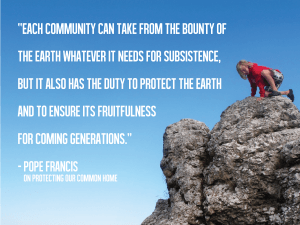A moral responsibility
 Pope Francis’ call to action should spur us all to look at the effect of our consumer lifestyles.
Pope Francis’ call to action should spur us all to look at the effect of our consumer lifestyles.
Last week the Vatican released Pope Francis’ encyclical, the Church’s highest level of teaching, on the environment. Reaching far beyond one religion, Francis called on “every person living on this planet” to recognize the effects that two hundred years of industrialization have had on our environment. He accentuated the moral obligation we have to conserve our natural resources for future generations.
The message of moral responsibility to our grandchildren and their grandchildren is one that has been downplayed by the environmental movement for the last twenty years. It was replaced by economic arguments demonstrating that protecting the environment and cutting greenhouse gases will have greater benefits to society than the sum of their dollar costs. These economic arguments arose out of a need to convince policymakers and CEO’s that going green can strengthen their bottom line.
The roots of conservation and stewardship dating back to John Muir, Teddy Roosevelt, and Aldo Leopold, have a strong theme of using only what we need and protecting the rest for future generations. Before that, many of the Native American nations hewed to the Seven Generations principle that important decisions must honor those seven generations in the past and consider the well-being of those seven generations in the future. Today, thousands of backpackers and outdoor enthusiasts follow “Leave No Trace” practices when they are in nature. The Pope is calling for this sense of moral and personal responsibility to become common habits of our daily lifestyles.
Francis is correct that today’s consumerism is devouring natural resources and creating waste at a rate that will leave our grandchildren with a planet our grandparents would scarcely recognize. He urges “Humanity [to] recognize the need for changes of lifestyle, production and consumption”. What can an individual do? For starters, look at your weekly trash can. The average American produces 30 pounds of trash per week. Much of that is unconsumed food, packaging material, and cheap single-use products like paper towels and plastic water bottles. Can you reduce your purchases of items that are single-use or come in excessive packaging? Can you recycle more each week than you put in the trash bin? As a society, once we start paying attention to the waste we generate, we may become more inclined towards closed product lifecycles, or what Francis calls a “circular model of production,” where materials are continually recycled into new products. This awareness goes beyond shrinking the size of our landfills. The things we buy and subsequently discard require enormous production inputs. For example, that bottle of chilled spring water can be 2000 times more energy intensive than turning on the tap for a drink. The bottled water industry in the US requires energy equivalent to 32-54 million barrels of oil each year to pump, bottle, transport, and chill that water before it touches your lips.
As I have just proven, it is difficult to get away from economic arguments and they will continue to be important to policymaking. The moral arguments, whether you call them religion, a land ethic, environmental justice, or personal responsibility, still form the underpinnings of the conservation movement. “Our Common Home,” as Francis calls our planet, is not only home to us living in 2015. It is home to the billions of children yet to come who have every right to a planet with a healthy climate, abundant clean water, awe-inspiring landscapes, and resilient communities. It is our undeniable responsibility to hand them planet at least as healthy as we inherited from our ancestors, if not better. To accomplish this, we must make personal and national decisions that reflect a commitment to conservation and stewardship of our planet and its resources. Your daily choices do matter!
June 24, 2015 by Brian Ambrette






